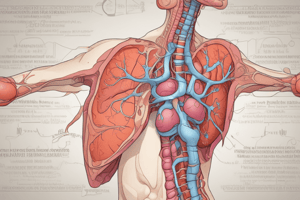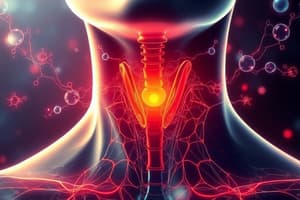Podcast
Questions and Answers
What is the main function of the pancreas in its endocrine role?
What is the main function of the pancreas in its endocrine role?
- Production of digestive enzymes
- Regulation of blood sugar levels (correct)
- Storage of glucose in muscles
- Release of glucose into the small intestine
Which hormone promotes the storage of glucose in the liver and muscles?
Which hormone promotes the storage of glucose in the liver and muscles?
- Adrenaline
- Insulin (correct)
- Thyroxine
- Glucagon
What is the role of glucagon in the body?
What is the role of glucagon in the body?
- Stimulating release of glucose from liver (correct)
- Lowering blood sugar levels
- Storing glucose in muscles
- Promoting digestion in the small intestine
Which gland is known as the 'master gland' in the endocrine system?
Which gland is known as the 'master gland' in the endocrine system?
What is the function of the thyroid gland within the endocrine system?
What is the function of the thyroid gland within the endocrine system?
Which glands are located throughout the body, releasing hormones into the bloodstream or surrounding fluid?
Which glands are located throughout the body, releasing hormones into the bloodstream or surrounding fluid?
What is the primary function of the thyroid gland?
What is the primary function of the thyroid gland?
Which gland is known as the 'master gland' and is located at the base of the brain?
Which gland is known as the 'master gland' and is located at the base of the brain?
What is the main function of hormones in the body?
What is the main function of hormones in the body?
Which part of the adrenal glands helps control salt and water balance in the body?
Which part of the adrenal glands helps control salt and water balance in the body?
What is the function of catecholamines produced by the adrenal medulla?
What is the function of catecholamines produced by the adrenal medulla?
Which gland is responsible for maintaining a balance in the body and ensuring healthy blood sugar levels?
Which gland is responsible for maintaining a balance in the body and ensuring healthy blood sugar levels?
Flashcards are hidden until you start studying
Study Notes
The Endocrine System: Understanding the Pancreas, Thyroid Gland, Hormones, Pituitary Gland, and Adrenal Glands
The endocrine system, also known as the hormone system, plays a crucial role in regulating various biological processes in the human body. It consists of glands located throughout the body, hormones made by these glands and released into the bloodstream or the fluid surrounding cells, and receptors in various organs and tissues that recognize and respond to the hormones. In this article, we will focus on the subtopics of the pancreas, thyroid gland, hormones, pituitary gland, and adrenal glands, providing an in-depth understanding of their roles and functions within the endocrine system.
Pancreas
The pancreas is a gland located in the abdomen that has both exocrine and endocrine functions. The exocrine function involves the production of digestive enzymes that are released into the small intestine to aid in the digestion of food. The endocrine function of the pancreas involves the production and release of hormones into the bloodstream. The two main hormones produced by the pancreas are insulin and glucagon, which work together to regulate blood sugar levels in the body.
Insulin is a hormone that promotes the storage of glucose (sugar) in the liver and muscles, thereby lowering blood sugar levels. Glucagon, on the other hand, is a hormone that stimulates the release of glucose from the liver into the bloodstream, raising blood sugar levels. These two hormones maintain a balance in the body, ensuring that blood sugar levels remain within a healthy range.
Thyroid Gland
The thyroid gland, located in the neck, is responsible for the production of thyroid hormones, which play a critical role in the regulation of metabolism, growth, and development in the human body. The thyroid gland secretes two main hormones: thyroxine (T4) and triiodothyronine (T3). These hormones stimulate all the cells in the body, regulating various biological processes such as growth, reproduction, development, and metabolism. They also help in the proper functioning of the brain and nervous system.
Hormones
Hormones are chemical messengers that act as regulators of various physiological processes in the body. They are produced by the endocrine glands and are released into the bloodstream, where they travel to target cells and tissues that have compatible receptors. Hormones play a crucial role in controlling or regulating many biological processes, such as blood sugar control, differentiation, growth, and function of reproductive organs, and body growth and energy production. Examples of hormones include estrogens, androgens, thyroid hormones, and gonadal steroids.
Pituitary Gland
The pituitary gland, also known as the "master gland," is located at the base of the brain and plays a central role in the endocrine system. It receives signals from the hypothalamus, another part of the brain, and secretes hormones that act on other endocrine glands. The pituitary gland has two lobes: the anterior lobe and the posterior lobe. The anterior lobe produces its own hormones, several of which act on other endocrine glands, while the posterior lobe secretes hormones that are made by the hypothalamus.
Adrenal Glands
The adrenal glands, also known as the suprarenal glands, are located on top of each kidney and are composed of two parts: the outer cortex and the inner medulla. The cortex produces hormones called corticosteroids, which help control salt and water balance in the body, the body's response to stress, metabolism, the immune system, and sexual development and function. The medulla produces catecholamines, such as epinephrine (adrenaline), which increases blood pressure and heart rate when the body is under stress.
In conclusion, the endocrine system, including the pancreas, thyroid gland, hormones, pituitary gland, and adrenal glands, plays a vital role in regulating various biological processes in the human body. These glands and hormones work together to ensure the proper functioning of the body from conception through adulthood and into old age, including the development of the brain and nervous system, the growth and function of the reproductive system, and the metabolism and blood sugar levels.
Studying That Suits You
Use AI to generate personalized quizzes and flashcards to suit your learning preferences.




